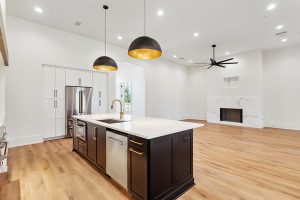Building vs. Buying a Home: Which Is Right for You?
Building a home allows for customization to your needs but can be more complex and costly than buying an existing home. Costs for building include labor, materials, permits, architectural plans, and inspections. Financing typically involves a home construction loan, which converts to a traditional mortgage upon completion.
Financing a New-Construction Home
You’d need a home construction loan, a short-term, higher-interest loan providing upfront capital. Borrowers pay interest-only during construction, and the loan converts to a traditional mortgage once complete.
Pros and Cons of Building a Home
Pros:
- Customization to exact specifications.
- No competition from other buyers.
- New construction means fewer immediate repairs.
- Newer homes may have wider market appeal when selling.
Cons:
- Longer build timelines, around 11 months.
- Numerous decisions and potential for project delays.
- Risk of cost overruns.
Costs of Buying a Home
Typical costs include down payment, closing costs, mortgage insurance, homeowners insurance, property taxes, and HOA fees.
Financing an Existing Home Purchase
Shopping for competitive mortgage rates, negotiating fees, and applying for assistance can help lower costs.
Pros and Cons of Buying an Existing Home
Pros:
- Faster move-in.
- Potential for negotiating lower prices.
- More location options.
- Ability to renovate over time.
Cons:
- Possible competition from other buyers.
- Older systems and appliances may need repairs.
- Compromises on features may be necessary.
- No builder warranty.
Should You Build or Buy?
Both building and buying have unique costs and challenges. Consider your timeline, budget, and specific needs to determine which option is best for you. Whether building your dream home or finding an existing property, the goal is to create a space that meets your needs and feels like home. Connect with a trusted real estate agent to explore your options.









